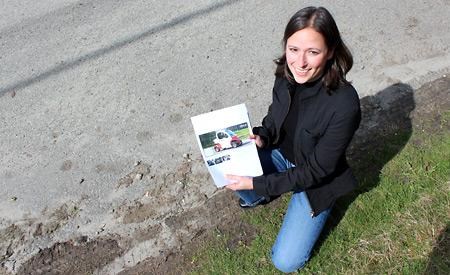A Powell River resident would like to use a low speed vehicle around town, but currently they are not allowed on City of Powell River streets.
Jessica Dohm made a presentation to council at the March 21 meeting, outlining the use of these vehicles and asking elected officials to adopt a bylaw that would permit them.
Low speed vehicles are essentially mini-cars, Dohm explained, zero-emission electric vehicles that have a maximum speed of 40 kilometres an hour (km/h). They can travel a maximum of 45 kilometres on a single charge. “They’re quiet, they’re environmentally friendly and they are quite economical with the cost of operation about one- to two-cents per kilometre driven,” she said. “The size of the vehicles range from a small compact car to that of a small-sized utility truck.”
The vehicles are ideally suited to in-town travel, Dohm said, for errand running or as a second family vehicle. They’re defined in the Motor Vehicle Safety Regulations and must meet mandatory safety requirements that are governed by Transport Canada, including having headlights, turn signals, brake lights, mirrors, parking brakes and seat belts. The classification does not include golf carts, powered mobility chairs, scooters, ATVs or off-road vehicles.
While safety requirements are set by Transport Canada, the use of low speed vehicles on public roads is regulated by each province. In 2008, BC was the first province to adopt low speed vehicle usage on its roads. The vehicles are required to be licensed and insured through ICBC (Insurance Corporation of BC).
The BC Motor Vehicle Act regulations stipulate that low speed vehicles may operate on public roads with posted speed limits of 40 km/h or less. As well, municipalities can expand the use of low speed vehicles in their communities by extending their use on roads with posted limits up to 50 km/h.
Currently, over 20 BC municipalities have adopted a bylaw permitting the vehicles on roads with posted speed limits of 50 km/h. In 2009, the City of North Vancouver purchased its first low speed vehicle as part of the city’s environment and parks department, replacing a diesel-powered vehicle. The city estimated the environmental impact is a savings of 500 litres of fuel each year and 1.4 tonnes of greenhouse gas emissions.
“Powell River is ideally suited for the use of low speed vehicles,” Dohm said. “We don’t have any high speed roadways or intersections, we have a relatively low traffic volume and our traffic is only regulated by stop signs and six stop lights.”
Low speed vehicles are consistent with Powell River’s sustainability charter, Dohm also said. “We are an ecologically fragile environment,” she said. “We have forests, lakes, rivers, ocean and a wide variety of wildlife that we, as residents, must maintain stewardship of.”
Dohm asked council to consider adopting a bylaw that would permit low speed vehicles on roads with posted speed limits of 50 km/h. “The bylaw does not increase the maximum speed that low speed vehicles are actually allowed to travel,” she said. “All you’re doing is granting access to city roads.”
After Dohm’s presentation, council passed a motion directing staff to prepare a report about her request.



